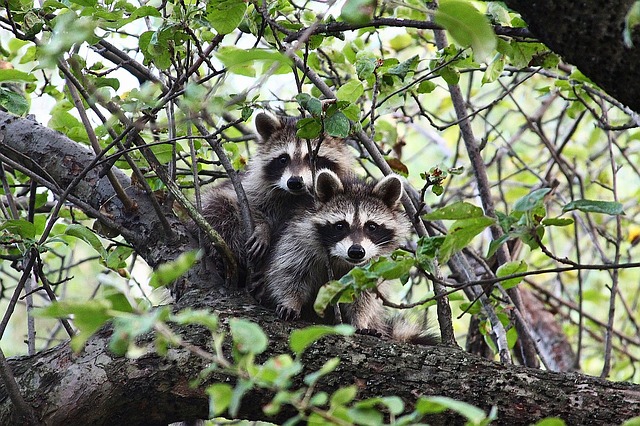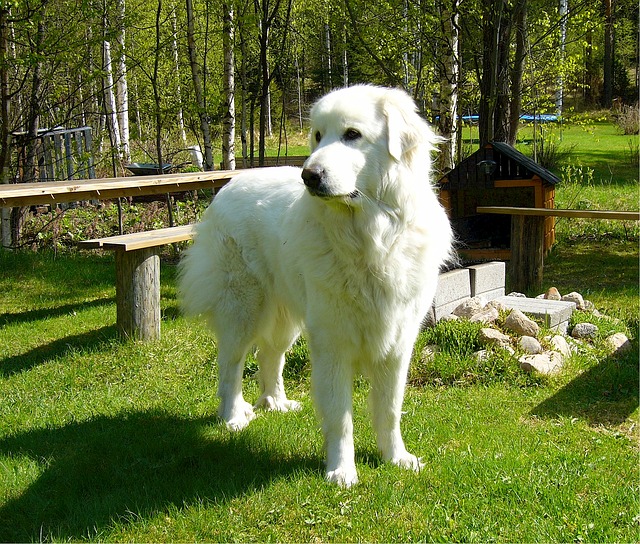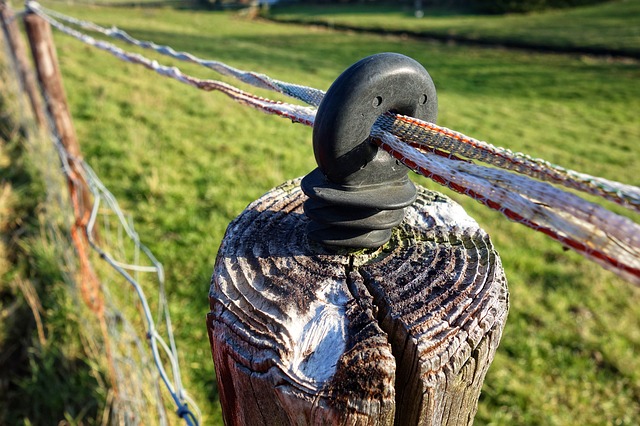A while back, Julie J. wrote in from Arkansas to ask for help with a bad raccoon problem. The coons were raiding her compost pile almost every single night, and they were really cramping Julie’s style—she relies on her pile to produce fresh compost for use in the veggie garden. She had already tried creating a barrier with hardware cloth, applying coyote urine, and even setting up a solar-powered motion light. None of these were doing the trick, so Julie decided to run the problem past all of us to see what the group would come up with.
We got many creative responses in, and I forwarded a summary on to Julie. Here’s what you said:
#1: Catch ‘Em
Trapping the raccoons was by far the most popular suggestion. While many people agree that trapping is a good option, opinions varied widely about the best thing to do with raccoons after you trap them. Be sure to check with your state wildlife service and any county or municipal authorities before you kill or relocate any raccoons.
FarmerDave became a seasoned expert at trapping during his family’s fight with a raccoon infestation, and he learned a valuable lesson about relocating them from the state fish and game department. If you didn’t already get a chance to read FarmerDave’s article about trapping and relocating raccoons, you can check it out here: “How Many Raccoons is Too Many Raccoons?”
Cap’n Dave also wrote in to suggest a trap that he has had success with. Cap’n Dave’s neighbor is in the habit of spreading around bags of cracked corn to attract birds and deer to his property for viewing. As a side effect of this, Dave gets more than his fair share of raccoons—and they’ve been a real problem for his ducks, chickens, and rabbits. You can read Cap’n Dave’s article here: “A Surefire Raccoon Trapping Solution.”
#2: Get a Dog (or Two)
The second-most-popular suggestion was the trusty dog, with several people citing Marjory’s advice from her DVD Grow Your Own Groceries.
Tom Holmes has 3 big compost piles, and he used to have critters coming every night to see what he had put out for their supper. Then he got a big dog to patrol the area, and his raccoon problem went away overnight.
Terri C. has two big dogs who live outside on her property, and they have been successful at keeping all of the wildlife away from the garden area. They take turns making the rounds day and night. She didn’t need to give them any special training, other than walking them around the perimeter regularly when they were puppies. Their barking can be a bother sometimes, but Terri enjoys the security of always knowing that her space is well protected. Her dogs live a happy life and they love doing their job.
#3: Ammonia and Vinegar
This is one of the simplest solutions we heard about. Several people wrote in to say that they have had success keeping raccoons out of the trash by using ammonia and vinegar. Lewis C. says “vinegar—a lot of it. If you use enough the coons will find it to be too sour.” And Jeanette says she used to pour ammonia over her trash every week to keep the critters out until it was picked up by the garbage truck. It worked great for her.
There was some discussion about whether or not ammonia or vinegar would be detrimental to the compost pile, but Susan F. suggested soaking some burlap in ammonia, and then using the burlap to cover the piles at night. Seems like this would be a good solution—perhaps someone will try it out and let us know how it worked.
#4: Blend and/or Bury the Food Scraps
If you didn’t already read it, Karen Donnelly wrote in with a suggestion about skipping the compost bin altogether and burying the food scraps right in the garden. You can read Karen’s article here: “How to Keep the Critters Off Your Compost.” She learned this trick from her aunt, and says that it has brought a huge worm population into her garden.
Ken suggested adding an extra step and collecting the scraps in a 5 gallon bucket. He says that letting the scraps sit out and rot for a while before burying them will make them distasteful to the raccoons. That way the coons won’t go into the garden to dig your scraps back up.
Joyce Ann took things one step further and suggested running all of the food scraps through a blender before burying them to liquefy the goodies—I guess raccoons like scraps more than scrap soup. Joyce Ann also suggested using a “bottomless bucket” to direct-deposit the liquid scraps into the garden soil.
#5: Blast ‘Em
We got some creative, and descriptive, suggestions in about just shooting the critters on sight. Again, please check with the appropriate authorities before you get your blast on. No doubt, this is an effective solution. The best tool for the job seems to be a matter of preference. When dealing with livestock predators, some people like the biggest bang, and others prefer the quietest crack.
#6: Electrify the Perimeter
A few people have had success using electrified fencing or netting to keep various critters away from the compost pile. Kat K. uses a 5 acre charger with 3 strands of wire around a small area. And Joyce Ann has seen her neighbors creatively wire some bushes and other areas to keep dogs and other critters at a distance. She says that, for most animals, it only took 1 jolt for them to learn their lesson.
3 More Solutions to Keep Raccoons Out of Your Compost
A few people sent in suggestions that nobody else thought of. Some of these were pretty interesting, so I thought I’d pass them on in case the other solutions don’t work for one reason or another.
Peggy’s family uses a small, blinking red light that comes on at night. It’s one of the simplest solutions, and it has been effective at keeping all kinds of animals out of their garden—even the coyotes that were eating her watermelons.
Grampa knows of a product that you spread onto a surface to repel birds and squirrels by burning their feet. By coating a wire or cloth with this product and covering the compost, you might have some success in keeping the coons at bay. (We think he’s referring to polybutene. There are various products (like this one) that use this for birds and squirrels.
And finally, Michelle wrote in to say that she has had success deterring those particularly stubborn critters by using lion’s urine. You can pick it up at pet shops, or online. It’s a little pricey, but not over the top, so it might be worth a try.
Thanks to everyone who wrote in to share their stories. Hopefully this list will be a valuable resource for others who find themselves fending off those pesky raccoons from their coops and gardens.
__________________________
The Grow Network is a participant in the Amazon Services LLC Associates Program, an affiliate program designed to provide a means for our team to earn fees for recommending our favorite products! We may earn a small commission, at no additional cost to you, should you purchase an item after clicking one of our links. Thanks for supporting TGN!
__________________________
(This is an updated version of an article that was originally published on August 28, 2015.)

The Grow Network is a global network of people who produce their own food and medicine. We’re the coolest bunch of backyard researchers on Earth! We’re constantly sharing, discovering, and working together to test new paths for sustainable living—while reconnecting with the “old ways” that are slipping away in our modern world. We value soil, water, sunlight, simplicity, sustainability, usefulness, and freedom. We strive to produce, prepare, and preserve our own food and medicine, and we hope you do, too!










COMMENTS(11)
Oy, how absolutely cruel and lacking in understanding of your fellow creatures… rotfl, except for Peggy’s red blinking light… we have a major compost operation that supplies our own garden needs when it’s through our 2 year system. Courtesy of Joe Jenkins… Humanure compost doesn’t entice trouble and doesn’t smell at all. Plus we have a troupe of little raccoons and their momma that we leave a couple of cups of sunflower seeds in a jar in the woods on good weather nights (SW Ohio)… they eat very tidy and always set the jar for refills, as they can… rotfl at these persnickety people who devalue humanure and then deny their neighbor-wildlife the resources that would be there if it weren’t for the humans taking over all the resources… ttyl
Get free, used coffee grounds from your local Starbucks. If they don’t already offer it, ask them to save for you “for carbon sequestration, soil microbiome, aquifer hydration, and other Earthly benefits”. Raccoons actually like coffee beans, so it doesn’t repel them, but it masks the smell of tasty treats, so works 95%. Sprinkle the coffee grounds over the tastiest treats. It’s a great contribution to your compost. I’ve used literally about 6 tons in recent years (typically 20 pounds each time I pass Starbucks).
The only time I live-trap raccoons is when they chew into the garage or attic, then I take them 5 miles away to a different watershed, so they will not find their way back.
I never killed one, but if I did then I would feel obligated to eat it (beware of ticks).
An electric fence is necessary to protect our grape vines from them. Uses an old car battery.
Solar motion-detector lights (about $10) are not perfect but greatly reduce thefts from our fruit trees.
Great summary post Michael
Spread rock salt (pickling salt or road salt) around any place they are a problem. They can not stand to get it on their hands. Keeps them out of my yard!
Very easy to trap raccoons without harming them at all. 55 gallon steel barrel with 1/2 lid on hinge with screen door spring attached so when 1/2 lid goes down with raccoon, the lid comes back up. Raccoons love tuna, so leave a can leaking on the hinged lid just out of reach for them. When they get on the hinged lid, down they go. First one I put out had so many raccoons in it, I had to have help to load them on a truck for relocating them about 30 miles away in the national forest. Tuna can hanging from a rod attached to the barrel can be adjusted so the can will be just high enough and not centered on barrel, they can not stand still – they must get tuna can and they’ll jump to get it – ooooops
This article mentions “a product that you spread on to a surface to repels birds and squirrels by burning their feet.”
What is it????
Hi Jacob – I believe Grampa was referring to polybutene. There are various products that use this for birds & squirrels – here’s one – http://www.amazon.com/Eatons-4-The-Birds-Repellent-Gel/dp/B003ORXPLC.
Bokashi composting ‘pickles’ the food scraps, which seem to be unpalatable to critters and the food, once put in the compost or directly buried, decomposes quickly – perhaps because the earthworms like the bacteria from the bokashi. I have used bokashi composting with meat scraps and everything else you’re not supposed to compost for fear of attracting critters. They don’t mess with my pile.
First let me say that raccoons are doing what they do naturally and it’s not a bad thing. Humans are late comers on the scene and from my experience, it’s best to try to fit into the flow of life.
One could look at raccoons in the compost as a benefit; they are mixing it up and speeding decomposition. That said, there are two options to deter them: a very large dog (two is better) or a carefully designed barrier. Raccoons are surprisingly strong animals and determined, so you a durable barrier is essential. Make one using chain link fencing, including a hinged top and side/door: 6’x6’x4′. Set it on a double layer of aviary wire. This could be a commercial dog kennel or you could get one made to order: http://www.hooverfence.com/kennel/ Cover the pile, as needed to adjust moisture, with a tarp on the inside of the barrier.
If you have chickens, a win-win solution would be to have a secure chicken pen with a chain link fence yard for them into which you could toss your compost.
The only problem I have with raccoons is when they get my chickens. Other than that, I think they’re pretty cool. I confess that I’m a fan of the “blast ’em” method. But the downside is that you have to find them first. And for me, that usually means I’ve already got some dead chickens.
I agree with Scott. I’m usually a fan of mischievous Trash Pandas. Yet, all bets are off if they go after the Chooks!